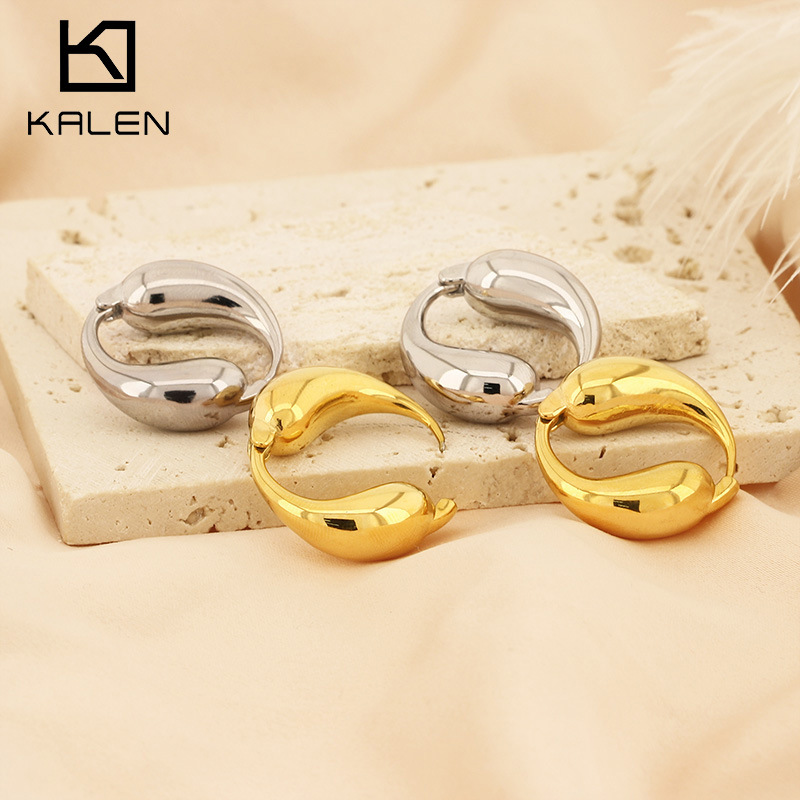Introduction
When it comes to choosing earrings, especially for those with sensitive skin, the material matters. Stainless steel, known for its durability and luster, has become a popular choice. But the crucial question remains: are stainless steel earrings hypoallergenic? This article delves deep into the world of stainless steel earrings, exploring their hypoallergenic properties, styles, and maintenance, to provide you with a thorough understanding and helpful tips.
Understanding Stainless Steel
Composition and Types
Stainless steel is an alloy composed of iron, chromium, and often nickel. The varying types, such as 304 and 316L, offer different properties. While 304 is common in kitchenware, 316L, also known as surgical stainless steel, is preferred for jewelry due to its minimal nickel content, reducing the risk of allergic reactions.
Comparison with Other Metals
When compared to metals like silver or gold, stainless steel stands out for its affordability and strength. It's less likely to scratch or tarnish, making it a practical choice for everyday wear.
Hypoallergenic Properties of Stainless Steel
What Makes Stainless Steel Hypoallergenic?
The low nickel content in certain types of stainless steel, like 316L, is key to its hypoallergenic nature. This reduces the likelihood of skin irritation, making it a safer option for those with metal allergies.
Benefits for Sensitive Skin
For individuals with sensitive skin, stainless steel earrings can be a game-changer. They offer a comfortable wearing experience without the fear of allergic reactions or skin irritation, ensuring both safety and style.
Are Stainless Steel Earrings Hypoallergenic?
Analyzing the Hypoallergenic Nature
Delving into the science, stainless steel's hypoallergenic properties are attributed to its stable alloy composition. This stability prevents metal ions from leaching into the skin, a common cause of allergic reactions.
Personal Experiences and Reviews
Many users with sensitive ears have reported positive experiences with stainless steel earrings. Their testimonials highlight the comfort and irritation-free experience, reinforcing the metal's hypoallergenic claims.
Choosing the Right Stainless Steel Earrings
Factors to Consider
When selecting stainless steel earrings, consider the type of stainless steel, design, and closure type. Opting for 316L surgical stainless steel is advisable for maximum hypoallergenic benefits.
Top Picks for Sensitive Ears
Explore a curated list of stylish and safe stainless steel earrings, handpicked for their hypoallergenic properties and fashionable designs.
Caring for Stainless Steel Earrings
Maintenance Tips
Maintaining the luster and hypoallergenic nature of stainless steel earrings is easy. Regular cleaning with mild soap and water, followed by thorough drying, is usually sufficient.
Cleaning and Storage
Proper storage is crucial to prevent scratches and tarnish. Keeping earrings in a dry, fabric-lined jewelry box or pouch can help preserve their quality.
Myth vs. Reality: Common Misconceptions
Debunking Myths about Stainless Steel Jewelry
Dispelling common myths, such as stainless steel causing skin discoloration or corrosion, with factual information and expert insights.
Facts You Need to Know
Understanding the truth about stainless steel's hypoallergenic nature, durability, and maintenance can help make informed choices when purchasing jewelry.
Fashion and Style with Stainless Steel Earrings
Trendy Designs and Styles
Stainless steel earrings come in a myriad of designs, from classic studs to elegant hoops and statement pieces, catering to diverse fashion tastes.
How to Pair with Outfits
Tips on how to complement different outfits with stainless steel earrings, enhancing your overall look while maintaining skin comfort.
Expert Tips for Selecting Hypoallergenic Earrings
Advice from Jewelry Professionals
Gathering advice from jewelry experts on identifying genuine hypoallergenic stainless steel earrings and avoiding counterfeit or low-quality products.
What to Look for in Quality
Key indicators of high-quality stainless steel earrings include a smooth finish, secure closures, and a mark indicating the type of stainless steel used.
Stainless Steel Earrings for All Occasions
Versatility in Fashion
Showcasing the versatility of stainless steel earrings, suitable for casual, formal, and professional settings, making them a staple in any jewelry collection.
Best Choices for Different Events
Recommendations for selecting the perfect stainless steel earrings for various occasions, from everyday wear to special events.
Personal Stories: Experiences with Stainless Steel Earrings
Testimonials and User Experiences
Sharing real-life stories from individuals who have embraced stainless steel earrings, highlighting their journey from skepticism to satisfaction.
How Stainless Steel Changed Their Jewelry Choices
Understanding how the hypoallergenic nature of stainless steel has influenced users' jewelry preferences and boosted their confidence in wearing earrings.
The Health Perspective: Stainless Steel and Allergies
Medical Insights on Allergic Reactions
Exploring medical perspectives on metal allergies and the role of hypoallergenic materials like stainless steel in preventing reactions.
Safe Jewelry Practices
Providing guidelines for safe jewelry practices, especially for those with known metal allergies or sensitive skin.
Sustainability and Stainless Steel Jewelry
Eco-friendliness of Stainless Steel
Discussing the sustainability aspect of stainless steel, including its recyclability and long-lasting nature, contributing to its eco-friendly appeal.
Impact on the Environment
Examining the environmental impact of stainless steel production and how choosing sustainable jewelry options can make a difference.
FAQs on Stainless Steel Earrings
-
What Makes Stainless Steel Earrings Hypoallergenic?
Stainless steel's hypoallergenic quality is primarily due to its composition. High-quality stainless steel, especially 316L or surgical stainless steel, contains minimal nickel, a common allergen in many metal alloys. The stability of the alloy prevents metal ions from leaching into the skin, reducing the risk of allergic reactions. This makes stainless steel a safe choice for those with sensitive skin or metal allergies. -
Can Stainless Steel Earrings Cause Allergic Reactions?
While stainless steel earrings are generally safe for most people, there is a small chance of allergic reactions, primarily if the earrings contain nickel. However, this risk is significantly lower with high-quality stainless steel (like 316L surgical stainless steel), which has minimal to no nickel content. It’s always advisable for individuals with known metal allergies to consult with a dermatologist or allergist. -
How Do I Care for My Stainless Steel Earrings?
Caring for stainless steel earrings is straightforward. Regular cleaning with a mild soap and warm water, followed by a thorough rinse and drying, is sufficient. Avoid using harsh chemicals or abrasive materials that could scratch the surface. Store your earrings in a dry place, preferably in a fabric-lined jewelry box, to prevent scratches and tarnish. -
Are Stainless Steel Earrings Suitable for Everyday Wear?
Yes, stainless steel earrings are an excellent choice for everyday wear. Their durability, resistance to rust, corrosion, and tarnish, and hypoallergenic properties make them ideal for continuous use. Additionally, their versatility in design fits various styles and occasions, from casual to formal. -
Can Stainless Steel Earrings Tarnish or Corrode Over Time?
Stainless steel is highly resistant to tarnish and corrosion due to its chromium content, which forms a passive layer of chromium oxide that protects the metal. However, under extreme conditions or if not properly maintained, stainless steel might show signs of wear. Regular cleaning and proper storage can significantly minimize these risks. -
How Do I Choose the Right Type of Stainless Steel for My Earrings?
When choosing stainless steel earrings, look for 316L or surgical stainless steel, particularly if you have sensitive skin. This type of stainless steel has a lower nickel content and offers superior resistance to corrosion and tarnish. Additionally, check for any certifications or quality marks from the manufacturer, which can indicate the purity and quality of the metal.









